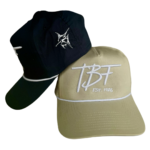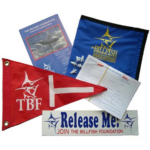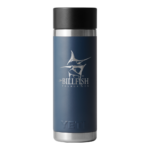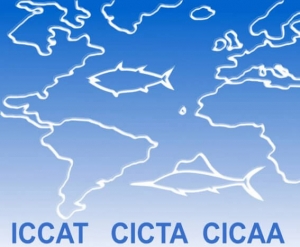
For years, members of the sportfishing community have felt that scientists and fisheries managers should consult those on the water and in the industry when making decisions. Our community is able to “see” firsthand what is happening and can provide valuable input. Our latest Winthrop P. Rockefeller Student Ocean Program Intern, Briana Gibbs, performed an in-depth analysis of the value of this input and presented her findings to the International Commission for the Conservation of Atlantic Tunas (ICCAT).
In her analysis, Briana identified key changes in fishing gear and technology that impacted the recreational catch of billfish between 1973 and 2019. The project identified gear modifications that have made it easier to catch billfish since the 1970s. This analysis is long overdue, as ICCAT, who manages all highly migratory species in the Atlantic, has assumed that the catchability of billfish has not changed for the duration of the National Marine Fisheries Service Recreational Billfish Survey (1973-2019). However, both scientists and anglers contest the assumption that it was just as easy to catch a marlin in 1973 as it is today. With Briana’s project, The Billfish Foundation was finally able to provide data to back this claim.
After conducting a literature review and determining that there wasn’t enough information available on the subject, she contacted sportfishing industry professionals for their insight. Those captains, anglers, tournament directors, and industry professionals discussed both their personal experiences within the fishery and how fishing technology has changed over time to help in order to augment and inform her report. Synthesizing their input with the input of billfish scientists, her paper described the significant changes seen in the fishery over the last 46 years.
This project identified some major technological advances that have impacted the billfish fishery, including those in communication, navigation, and detection of fish location. Over the last four and a half decades, communications technology has dramatically improved, as the technology advanced from VHF radios to the internet and the widespread use and availability of smart phones. Navigation has substantially evolved, as the Loran technology of the 1970s was replaced with the development and improvement of GPS, which has become increasingly precise. In addition, sonar technology has continued to improve, with enhanced r differentiation of the contents of the water column. In conjunction, advanced technology has become increasingly more affordable. Together, these technological improvements have made it easier for anglers to reliably locate and catch billfish.
In addition to advances in technology, gear and construction changes in the rod and reel have made use of advanced materials that improved strength, decreased material breakdown, and reduced the need for maintenance. The standardized use of circle hooks has improved the survivability of captured billfish, enabling them to be caught and released multiple times. In addition to these gear changes, the use of Fish Aggregating Devices (FADS) has dramatically increased, thereby enhancing the ease of locating and catching billfish, which can reliably be found at FADs.
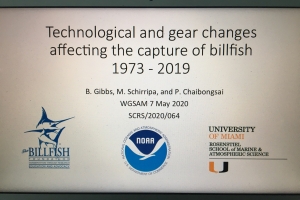
Briana’s internship culminated with her submitting her paper and presenting her work at the ICCAT meeting for the Working Group on Stock Assessment Methods (WGSAM) on May 7, 2020. This is only the second time a TBF intern has presented here, as Heather Sadusky, who presented on anchored FAD management, also presented at the ICCAT WGSAM two years ago. WGSAM helps advise how future stock assessments should be conducted. The discussion following her paper presentation raised important questions for future billfish management, concluding that fisheries scientists should examine historical catches and create new mathematical models to reflect the changes that were investigated.
Since the Winthrop P. Rockefeller Student Ocean Intern program’s inception in 2006, it has had over 30 students, most of whom were graduate level, complete numerous projects ranging from policy, science, and education. This initiative carries on Win’s vision of responsible ocean and fish stewardship by providing valuable work experience to selected students and recent graduates. To learn more about our internships, go to www.billfish.org/internships.

